Silence (2016): even better than the first time | aún mejor que la primera vez

Basada en una novela japonesa
With so many movies yet to be seen and the sheer number of projects coming out every week, it's sometimes hard to decide to rewatch a movie you already know about, especially if it's a long running one. However, as David Gilmour, the film critic and not the musician, put it, "The second time you see something is truly the first because only by knowing how it ends can you judge how well it was done from the beginning" (it may not be the exact phrase, but it's the idea of what I want to say).
Con tantas películas aún por ver y la enorme cantidad de proyectos que salen cada semana, a veces es difícil decidir volver a ver una película que ya se conoce, especialmente si tiene una duración prolongada. Sin embargo, tal como dijo David Gilmour, el crítico de cine y no el músico, "La segunda vez que ves algo es verdaderamente la primera porque sólo sabiendo cómo termina puedes juzgar cuán bien hecha está desde el principio" (puede que no sea la frase exacta, pero es la idea de lo que quiero decir).
In this case, the reason I rewatched Silence, aside from the obvious reason that I loved it when I first saw it years ago, is because I recently read the book the movie it's based on. Chinmoku (Silence, in English) is a 1966 Japanese historical fiction novel written by renowned author Shūsaku Endō. Briefly tells the story of a Jesuit missionary sent to Japan in the 17th century, who suffered persecution in the days of the Kakure Kirishitan ("hidden Christians") that followed the defeat of the Shimabara rebellion in 1637. This novel obtained the acclaimed Tanizaki Prize and is considered one of the best novels of the 20th century. After the prologue, the first part is written in the form of a letter from its central character, but then returns to the narrator in the third person. The entire historical framework serves as a background to raise the controversial issue of a silent God who accompanies a believer in adversity, why is God silent in the face of human suffering? Why is he silent in the face of the cruelty of others? Evoking other characters from literature and cinema (such as some of Bergman) the protagonist of the story has a crisis of faith which, being a priest, is not minor.
En este caso, la razón por la que volví a ver Silence, además de la obvia razón de que la amé cuando la vi por primera vez hace años, es porque recientemente me leí el libro en el cual está basada la película. Chinmoku (Silencio, en español) es una novela japonesa de 1966 de ficción histórica escrita por el reconocido autor Shūsaku Endō. En pocas palabras trata la historia de un misionero jesuita enviado a Japón en el siglo XVII, quien sufrió persecución en la época de los Kakure Kirishitan ("cristianos ocultos") que siguió a la derrota de la rebelión de Shimabara en 1637. Esta novela obtuvo el aclamado Premio Tanizaki y es considerada una de las mejores novelas del siglo XX. Después del prólogo, la primera parte está escrita en forma de una carta de su personaje central, pero luego vueve al narrador en tercera persona. Todo el marco histórico sirve de fondo para plantear el polémico tema de un Dios silencioso que acompaña a un creyente en la adversidad, ¿por qué Dios calla ante el sufrimiento humano? ¿por qué guarda silencio ante la crueldad de los demás? Evocando a otros personajes de la Literatura y el cine (como algunos de Bergman) el protagonista de la historia tiene una crisis de fe lo cual, siendo sacerdote, no es menor.
The two young Portuguese Jesuits (Andrew Garfield and Adam Driver) who travel to the land of the rising sun in search of their mentor, Father Ferreira (Liam Neeson), have the firm intention of not only finding Ferreira but also discovering what happened in that distant and strange land that is Japan. In their search, they will suffer the persecution and torture with which the Japanese authorities persecute and even kill Christians, punishing them until they make a difficult decision: apostatize (publicly renounce their faith) or die. One of the things that I liked the first time and that I highlight even more in this second one is that the script is very well adapted, it respects the essence of the story and the characters and does true justice to the novel. Scorsese read the novel between hotels, taxis and airports in 1989 when he was invited to Japan by none other than Akira Kurosawa, who offered him a small role in his film Dreams in which Martin would play Vincent Van Gogh. Since then, Scorsese began working on the script to bring Silence to the big screen, but between one thing and another, more than twenty years passed between his encounter with the novel and the release of its adaptation. The fact that, after so long, he still wanted to make the film shows how important it was for him to tell this story.
Los dos jóvenes jesuitas portugueses (Andrew Garfield y Adam Driver) que viajan a la tierra del sol naciente en busca de su mentor, el Padre Ferreira (Liam Neeson), tienen la firme intención de, no sólo encontrar a Ferreira sino también descubrir lo que ocurrió en esa tierra lejana y extraña que es Japón. En su búsqueda, sufrirán la persecución y las torturas con que las autoridades japonesas persiguen e incluso matan a los cristianos, a los que castigan hasta llevarlos a una decisión difícil: apostatar (renunciar públicamente a su fe) o morir. Una de las cosas que me gustó la primera vez y que destaco aún más en esta segunda es que el guión el está muy bien adaptado, respeta la esencia de la historia y de los personajes y le hace verdadera justicia a la novela. Scorsese leyó la novela entre hoteles, taxis y aeropuertos en 1989 cuando fue invitado a Japón por nada más y nada menos que Akira Kurosawa, quien le ofreció un pequeño papel en su película Dreams en la que Martin interpretaría a Vincent Van Gogh. Desde entonces, Scorsese comenzó a trabajar en el guión para llevar Silence a la gran pantalla, pero entre una cosa y otra, pasaron más de veinte años desde su encuentro con la novela y el lanzamiento de su adaptación. El hecho de que, después de tanto tiempo, mantuviera el deseo de realizar la película, demuestra cuán importante era para él contar esta historia.
In my opinion, it was important that he tell it, beyond the religious creed that each one professes. Let's put ourselves in the situation of the protagonist: he's a priest, someone who has dedicated his life to the service of others in the name of God, of his faith, who firmly believes in the existence of a deity he cannot see. And this father goes to a distant country unlike anything he has ever known, a country where Christianity seems unable to take root. And in that country they persecute Christians and torture them, they make them suffer. And the only thing that the authorities expect from the priest is that he apostatize, that he invalidate the faith of his entire life in exchange for the life and health of those tortured. Put in that situation, should he apostatize, if only for formality, and save the life of his fellow men? Or should he stand firm and let more people continue to die for their God? A God who, in the thoughts of the protagonist himself, does not do or say anything. A God who remains silent in the face of the pain of his believers. It's a morally and spiritually interesting situation for the purposes of the story that we are told.
En mi opinión, era importante que la contara, más allá del credo religioso que cada uno profese. Pongámonos en la situación del protagonista: es un sacerdote, alguien que ha dedicado su vida al servicio de los demás en nombre de Dios, de su fe, que cree firmemente en la existencia de una deidad a la que no puede ver. Y este padre va a un país distante y diferente a todo lo que no ha conocido, un país en el que el cristianismo pareciera no poder arraigarse. Y en ese país persiguen a los cristianos y los torturan, los hacen sufrir. Y lo único que las autoridades esperan del sacerdote es que apostate, que invalide la fe de toda su vida a cambio de la vida y la salud de esos torturados. Puesto en esa situación, ¿debe apostatar, aunque sólo sea por formalidad, y salvar la vida de su prójimo? ¿o debe mantenerse firme y que más personas sigan muriendo por su Dios? Un Dios que, en pensamientos del propio protagonista, no hace ni dice nada. Un Dios que guarda silencio ante el dolor de sus creyentes. Se trata de una situación moral y espiritualmente interesante para efectos de la historia que se nos cuenta.
The central priest speaks to God, questions, rebukes, but for much of the film, the deity seems to be silent. The maturity of the script, the seriousness and depth of the issues it deals with, the excellent direction and excellent photography make this film a delight for lovers of dramas, religious themes and good cinema. If you also have the opportunity to read Endo's novel, do it, it's a great experience and an example of how to successfully adapt a story, has anyone seen it? I read you in the comments.
El sacerdote central habla a Dios, pregunta, cuestiona, increpa, pero durante gran parte de la película, la deidad parece guardar silencio. La madurez en el guión, la seriedad y profundidad de los temas que trata, la excelente dirección y una fotografía excelsa convierten a esta película en un deleite para los amantes de los dramas, los temas religiosos y el buen Cine. Si además, tienen la oportunidad de leer la novela de Endo, háganlo, es una gran experiencia y un ejemplo de cómo adaptar exitosamente una historia, ¿alguno la ha visto? Los leo en los comentarios.
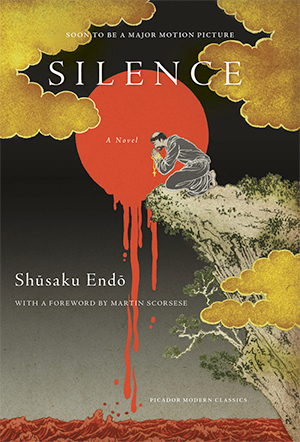
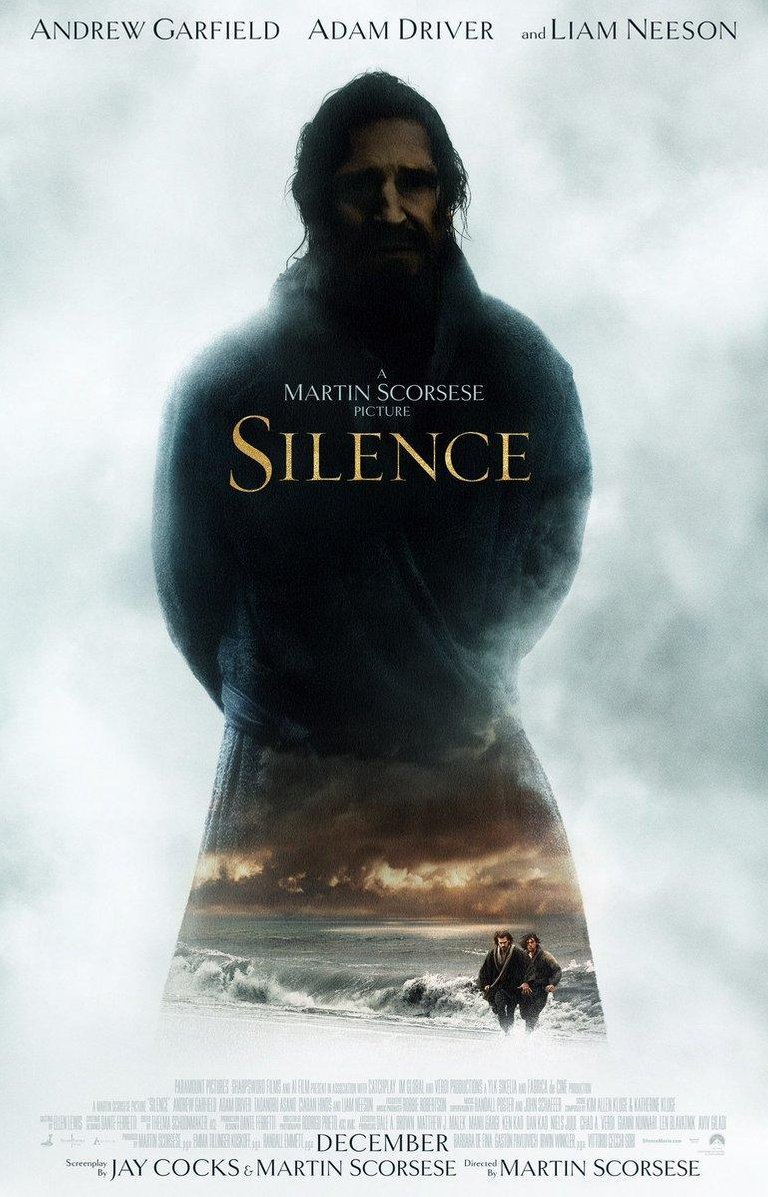
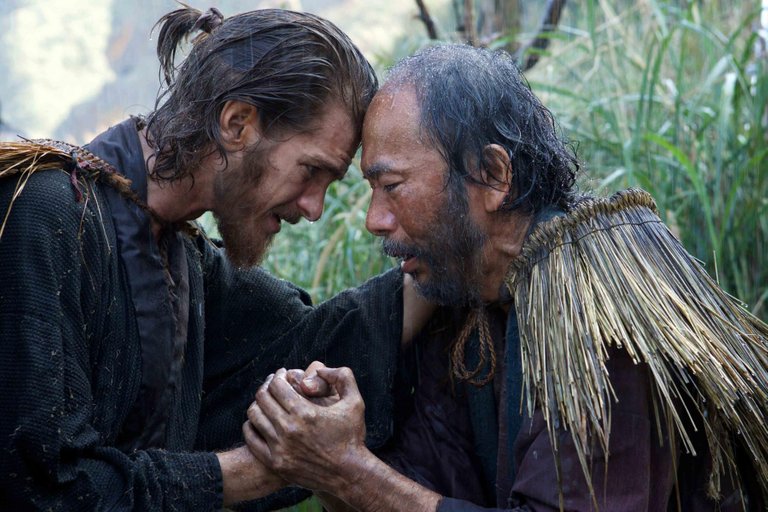
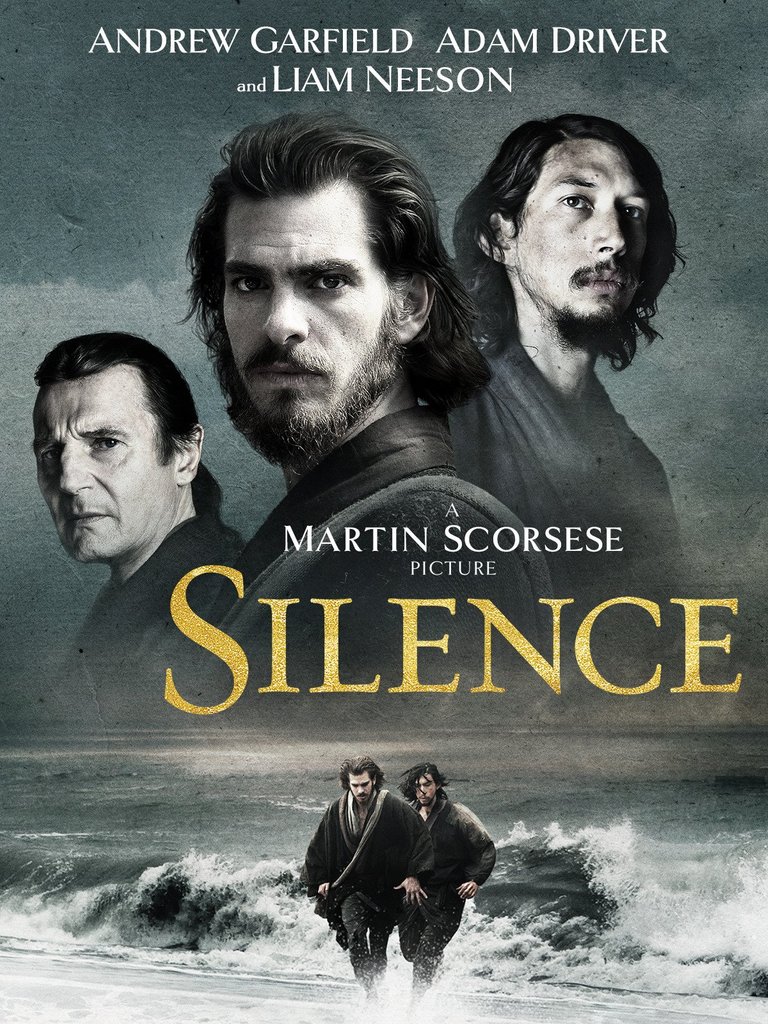
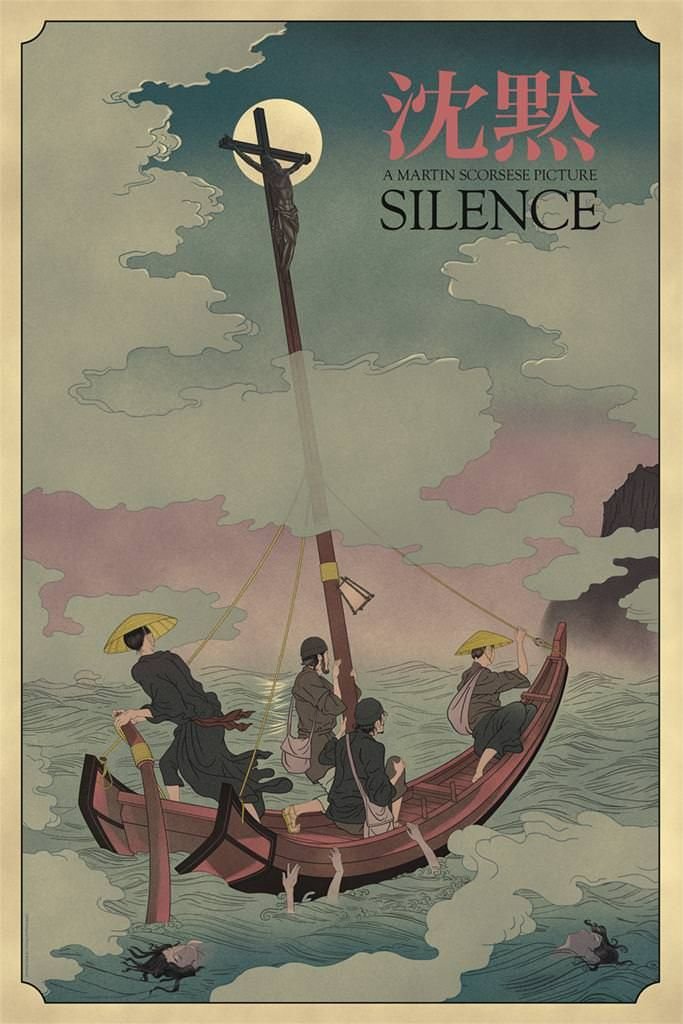
Hola @cristiancaicedo,
Magnífica reseña. Algo que agradece el espectador es el respeto a la obra original y que la adaptación trata de reflejar la intención del escritor.
Me parece muy interesante la época en qué ocurren los hechos, ya que Japón fue una nación cerrada por muchos años a la influencia extranjera para garantizar arraigar su cultura. En nombre de eso ocurrieron muchas masacres (las que hacen referencia en 47 Ronin y The Last Samurai, por mencionar ejemplos) entonces nada bueno pudo pasarles a los Jesuitas portugueses ya que ellos fueron uno de los primeros extranjeros en asentarse en tierras japonesas. De ellos proviene el arte de hacer tempura, pero esa es harina de otro costal.
Me despertaste la curiosidad con este párrafo:
Un cuestionamiento muy humano en momentos de adversidad.
Gracias por tu recomendación, la buscaré para verla!
Exacto: Japón era un misterio para Occidente y en los siglos que siguieron al descubrimiento de América, los europeos (españoles, portugueses, ingleses, holandeses) viajaron a Oriente y quisieron de alguna manera imponer su modernidad. Te dejo una frase del libro: “Para vuecencia la predicación del evangelio es meterle a uno por los ojos un cariño que uno no quiere”.
Y dato curioso: el autor de la novela es japonés, pero es cristiano también.
Muchas gracias por tu aporte. Que estés muy bien.
Qué buena frase, es aplicable a varios aspectos de la vida...hay personas que tienen ese espíritu evangelizador al recomendarte algo que uno no ha pedido. Me gustó leerte!
Que estés muy bien y muchas gracias por leerme.
Yo vi esa película y me dio tanto dolor verla, definitivamente está reseña es espectacular, la volveré a ver porque la vi hace años y no la recuerdo muy bien, solo recuerdo lo cruda que fue y eso me impacto mucho .
Gracias por esta excelente review❤🙌
Sí, es dolorosa. Muchas gracias a ti por leerme. Saludos.
Hola, me encantan tus Review, tienes una increible narrativa, si vi la pelicula es extraordinaria, joyas ocultas que nos generan un debate moral y espiritual.
Mi hijo me ha enseñado que no hay que esperar un mesias, solo hay que entender que nosotros somos dios en la tierra.
Gracias por esta increible Reseña
Mira @acont no se si la viste pero es de esas peliculas para reflexionar.
Muchas gracias por su comentario y valoración. Saludos cordiales.
Creo que es la primera vez que escucho o mejor dicho leo de esta película, suena realmente interesante, cuenta con la gran actuación de LIAM, sin duda vale la pena verlo, sin dejar de mencionar el mensaje que transmite y la historia que nos cuenta, gracias por compartirlo, la anotaré en mi larga lista de pelis por ver jiji, saludos.
Cuando la vea, me cuenta qué tal le pareció. Saludos y gracias por leerme.
This movie is highly traumatazing yet super good.
That's a very accurate way to summarize it. Thanks for reading.